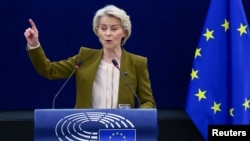It was no surprise that European Commission President Ursula von der Leyen came out swinging in all directions, though notably to the east, as she delivered her annual State of the European Union (SOTEU) speech in Strasbourg.
Only hours before her appearance in front of the European lawmakers on September 10, several Russian Shahed drones had entered Polish, and EU, territory in an unprecedented incursion.
Warsaw called for immediate NATO article 4 consultations, not triggered since shortly after Russia’s full-scale invasion of Ukraine over three years ago, and the mood was decidedly bullish.
Von der Leyen immediately expressed “full solidarity” with Poland and noted “we have all seen what Russia means by “diplomacy.”
Russian President Vladimir Putin’s message is clear, she said, and Europe’s answer must be as well.
But what will that answer be?
More sanctions for sure.
A 19th package on Russia is in the works already.
The bloc will speed up the process of cutting off Russian energy imports by 2027, will target further the Russian shadow fleet that helps keep Russian oil flowing out of the country to fund the war, and for the first time, Brussels might hit foreign companies with secondary sanctions.
Though von der Leyen didn’t mention it, European officials are also working on the possibility of limiting Russian tourist visas into the EU and to further limit the presence of Russian diplomats in the bloc.
Privately, few EU officials believe that this will change the calculations being made inside the Kremlin, but the EU will churn out more restrictive measures against Moscow for want of better ideas.
However, on the Ukraine side of the equation, the bloc is likely to act more decisively and attempt to strengthen Ukraine and the group’s eastern flank countries that she toured last week.
On Ukraine, she floated the idea of a “reparations loan” based on the cash balances associated with the over 200 billion euros of Russian frozen assets in the bloc.
Quite how this will work out and how much money this will garner remains to be seen, but she made clear that the money will not be outright confiscated, that the risk will be carried collectively and that Kyiv only has to pay back once Russia pays reparations.
Another proposal was the frontloading of 6 billion euros to support drone production in Ukraine.
With Poland under attack, von der Leyen devoted a large part of her speech on how countries in the eastern part of the EU will be defended.
Vowing to defend every inch of EU territory “from the Baltic Sea to the Black Sea,” she suggested financial support into what she called an “Eastern Flank Watch” which means money for real-time space surveillance and the building of a drone wall.
A roadmap, to be presented in October, with new common defense projects, was also touched upon, as was the September 9 distribution of 150 billion euros for joint military procurement.
Some 19 EU member states have so far tapped into the fund with Poland being the overwhelming beneficiary, followed by Romania.
Curiously, there wasn’t too much talk about EU enlargement -- and definitely no pronouncement of when the club may enlarge.
Instead, von der Leyen simply noted that “a larger and stronger Union is a security guarantee for all of us.” She also gave a rather half-hearted “let's make the next reunification of Europe happen” cheer as well.
In this context, she name-dropped Ukraine and Moldova and the Western Balkans. But Georgia and Turkey were notable omissions.
More than ever though, this speech was a battle-call for a more independent EU.
“This must be Europe's independence moment,” she asserted, adding that “Europe must fight for its place in a world in which many major powers are either ambivalent or openly hostile to Europe.”
Here, she had not only Russia and China in mind, but also the United States.
She noted that the images of US President Donald Trump and Putin meeting recently in Alaska were “not easy to digest,” and pointed out that 80 percent of EU trade is with countries other than the United States.
But she also urged her listeners to picture the chaos and repercussions “of a full-fledged trade war with the US.”
She went on by adding: “Put that image next to the one from China just last week. China flanked by the leaders of Russia and North Korea. Putin gloating about how Russia-China relations are at an unprecedented high.”
She may be right that “battle lines for a new world order based on power are being drawn right now” and that there is “no room or time for nostalgia.”
The bigger question, however, is whether the Europeans, including herself, are capable of delivering on their grand speeches. Especially, given Russia already is testing their resolve.











